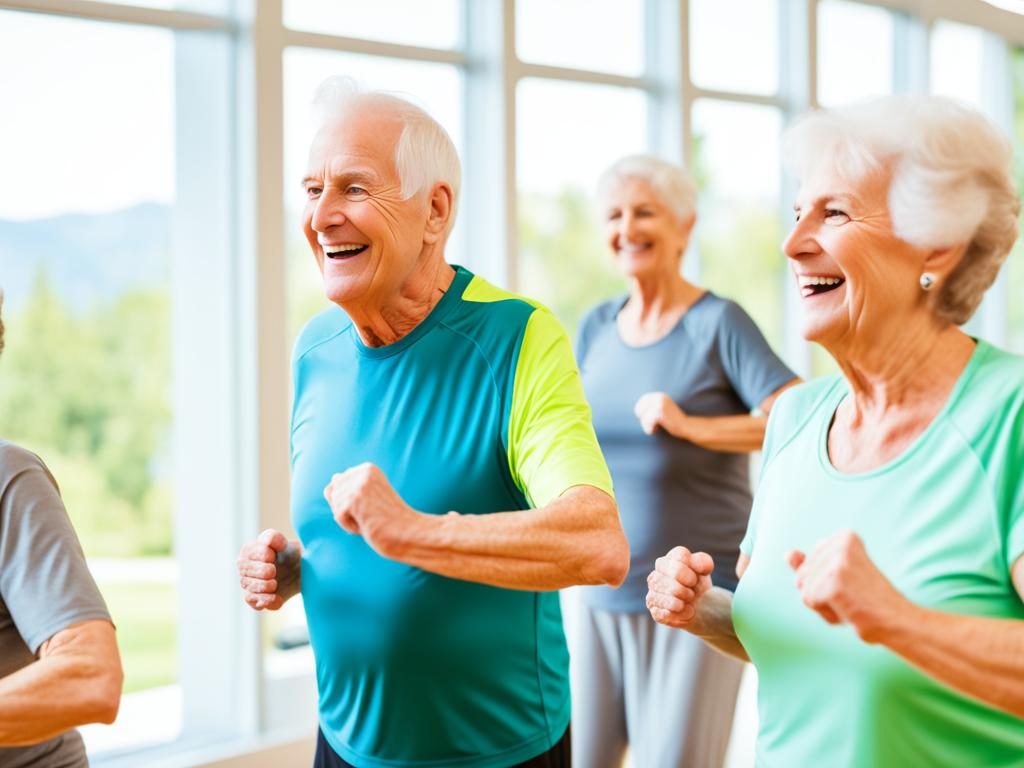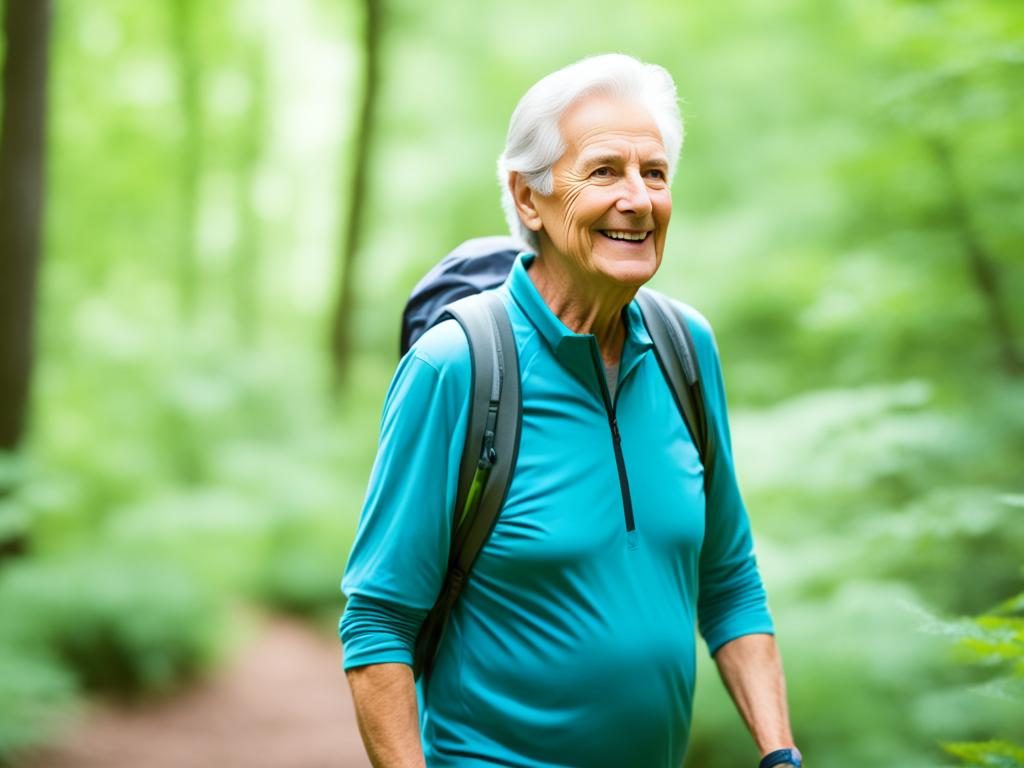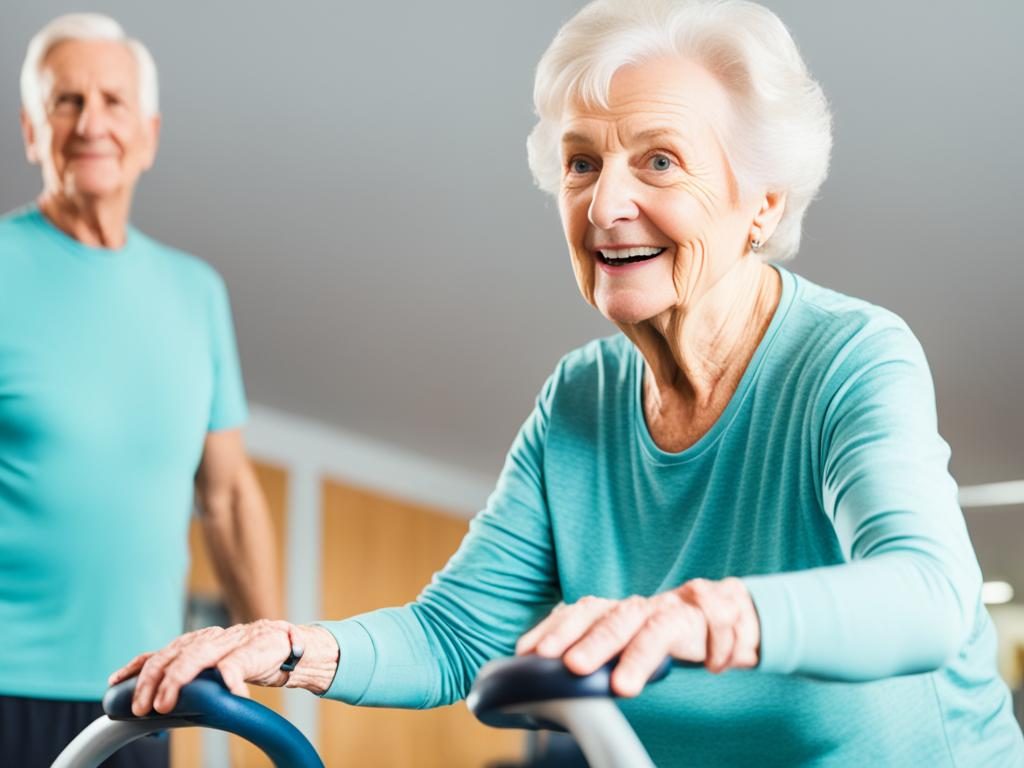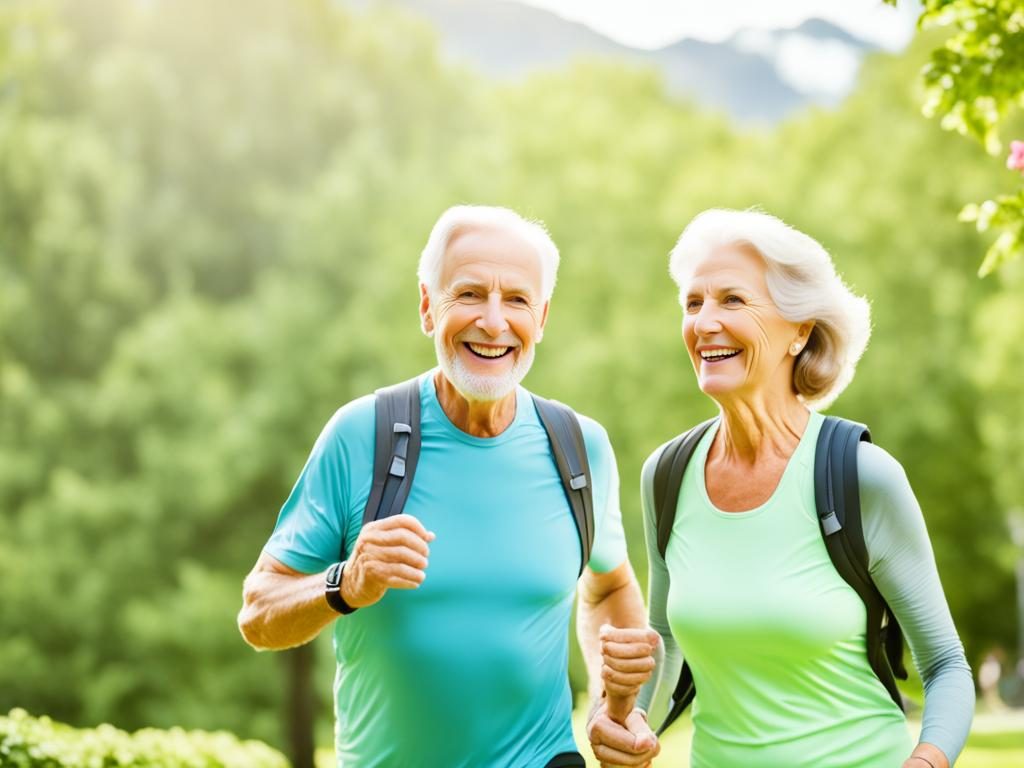Exercise and physical activity play a vital role in the overall well-being of seniors and aging adults. Engaging in regular physical activity not only promotes a healthy lifestyle but also provides a range of health benefits. From preventing diseases to improving mental health and sleep patterns, exercise is a powerful tool that can help seniors maintain their independence as they age.

Key Takeaways:
- Sports and exercise have numerous health benefits for seniors
- Regular physical activity can prevent diseases like heart disease and diabetes
- Exercise improves mental health, sleep patterns, and overall well-being
- Physical activity helps decrease the risks of falls and improves seniors’ balance and coordination
- By incorporating exercise into their daily lives, seniors can maintain their independence and enjoy a vibrant life
Preventing Disease through Exercise
Regular physical activity plays a critical role in disease prevention for seniors. Engaging in physical activity can help manage common diseases such as heart disease and diabetes, improving overall health and well-being. It is particularly important for seniors, whose immune systems may be compromised, to maintain a healthy immune function through exercise.
Research has shown that exercise enhances immune function in seniors, protecting them against infections and reducing the risk of developing chronic diseases. Even light forms of physical activity, like walking, can have significant benefits for disease prevention and management.
“Exercise not only strengthens the body but also boosts the immune system, helping seniors protect themselves against preventable diseases.”
By incorporating regular physical activity into their daily routines, seniors can effectively manage common diseases, reduce their reliance on medications, and improve their overall quality of life. It’s never too late to start reaping the benefits of exercise and taking charge of one’s health.
Regular exercise can enhance immune function and help seniors prevent and manage common diseases. It is an essential tool for maintaining good health, independence, and an active lifestyle even in older age.
Improving Mental Health and Sleep
Exercise plays a crucial role in enhancing mental well-being for seniors. It has been found to stimulate the production of endorphins, which act as natural stress relievers and promote feelings of happiness and satisfaction. By engaging in regular physical activity, seniors can experience a significant improvement in their mental health, leading to a greater overall sense of well-being.
Additionally, exercise has been shown to have a positive impact on sleep patterns, making it particularly beneficial for older adults who often struggle with insomnia. Regular physical activity helps regulate the body’s circadian rhythm, promoting better sleep quality and duration. By incorporating exercise into their daily routine, seniors can establish healthier sleep patterns and improve their overall quality of sleep.
Studies have shown that exercise can be just as effective, if not more effective, than certain medications for treating insomnia in older adults. The benefits of exercise on mental health and sleep extend beyond just improving quality of life; they also contribute to maintaining cognitive function and preventing age-related decline.
“Exercise is not only beneficial for physical health but also plays a vital role in boosting mental well-being and improving sleep patterns for older adults.” – Dr. Jessica Anderson, Sleep Specialist
By prioritizing regular physical activity, seniors can experience the mental health benefits of exercise while also improving their sleep patterns. It is important to remember that exercise doesn’t have to be intense or high-impact to be effective. Simple activities like walking, gardening, or swimming can make a significant difference in improving mental well-being and sleep for older adults.
Benefits of Exercise on Mental Health:
- Stress relief through the release of endorphins
- Promotion of feelings of happiness and satisfaction
- Reduction in symptoms of anxiety and depression
- Improved cognitive function and memory
- Enhanced overall well-being and life satisfaction
Benefits of Exercise on Sleep:
- Regulation of the body’s circadian rhythm
- Promotion of better sleep quality and duration
- Reduction of insomnia symptoms and sleep disturbances
- Prevention of age-related decline in sleep patterns
| Exercise Type | Mental Health Benefits | Sleep Improvement Benefits |
|---|---|---|
| Yoga | Relaxation, stress relief, improved mood | Increased sleep duration, decreased sleep disturbances |
| Walking | Endorphin release, reduced anxiety and depression | Better sleep quality, regulation of circadian rhythm |
| Swimming | Improved mood, enhanced overall well-being | Reduced insomnia symptoms, increased sleep duration |
Regular physical activity not only provides mental health benefits but also brings about positive changes in sleep patterns for older adults. Incorporating exercise into their daily routine can contribute to better mental well-being, reduced stress levels, improved sleep quality, and overall enhanced quality of life, leading to long-term health benefits for seniors.

Decreasing Risks of Falls
Older adults face a higher risk of falls, which can significantly impact their independence. However, there are measures seniors can take to prevent falls and maintain their autonomy. One essential approach is regular physical activity, which plays a crucial role in improving balance, coordination, and overall strength. By incorporating exercise into their routine, seniors can reduce the risk of falls and their associated consequences.
Exercise offers a range of benefits that directly contribute to fall prevention. It enhances strength, helping seniors maintain stability and navigate their surroundings confidently. Additionally, physical activity improves flexibility, allowing for greater mobility and reducing the chance of tripping or stumbling. Through targeted exercises, such as Tai Chi or yoga, seniors can enhance their coordination, refining their body’s ability to move with balance and control.
It is important to recognize the risk factors that make seniors more susceptible to falls. Factors such as muscle weakness, impaired vision, medication side effects, and environmental hazards can all increase the likelihood of a fall. Regular exercise can effectively address these risk factors, making it an invaluable tool for fall prevention.
“Exercise enhances strength, flexibility, balance, and coordination, which helps reduce the risk of falls for seniors.” – Dr. Emily Thompson, Geriatric Specialist
By engaging in physical activity, seniors can improve their overall health and well-being, ultimately leading to greater independence. The benefits extend beyond fall prevention, encompassing cardiovascular health, cognitive function, and mental well-being. With improved physical fitness, seniors can confidently pursue their goals and maintain an active lifestyle, free from the limitations imposed by falls.
Strategies for Fall Prevention
| Strategy | Description |
|---|---|
| Exercise | Regular physical activity that focuses on strength, balance, and coordination. Examples include walking, swimming, and resistance training. |
| Home Modifications | Adapting the living environment to reduce hazards. This may include installing grab bars, removing clutter, and improving lighting. |
| Vision Care | Regular eye check-ups and updating prescription glasses to ensure clear vision and reduce the risk of tripping on uneven surfaces. |
| Medication Review | Consultation with a healthcare professional to evaluate medications for side effects or interactions that could increase the risk of falls. |
| Nutrition | A balanced diet that includes adequate calcium and vitamin D to promote strong bones and reduce the risk of fractures. |
It is essential for aging adults to prioritize fall prevention and take proactive measures to maintain their independence. Regular exercise, along with other strategies, can significantly reduce the risk of falls, enabling seniors to live confidently and enjoy a higher quality of life.

Conclusion
Exercise plays a vital role in enhancing the overall well-being and maintaining the independence of seniors. By incorporating regular physical activity into their daily lives, aging adults can reap numerous benefits. Physical activity has been proven to prevent diseases, improve mental health, reduce the risk of falls, provide social engagement, and enhance cognitive function.
Regardless of age, it is essential for seniors to prioritize exercise and make it a habit. Whether it’s a brisk walk, swimming, or participating in group fitness classes, staying active is key. Exercise not only helps seniors maintain their physical health but also contributes to their mental well-being, providing a sense of accomplishment and satisfaction.
By incorporating exercise into their daily routines, seniors can experience improved cardiovascular health, increased muscle strength and flexibility, and better balance and coordination. These physical improvements translate into maintaining independence, as they are less likely to experience falls or rely on others for assistance.
In addition to these physical benefits, exercise offers social engagement, allowing seniors to connect with others and foster a sense of community. Regular physical activity has a positive impact on cognitive function as well, keeping the mind sharp and reducing the risk of cognitive decline.
FAQ
What are the health benefits of exercise for seniors?
Regular physical activity can prevent diseases like heart disease and diabetes, improve mental health and sleep patterns, decrease the risk of falls, and provide social engagement and improved cognitive function.
How does exercise prevent diseases in seniors?
Exercise improves overall immune function, which is particularly important for seniors whose immune systems may be compromised. Even light exercise, like walking, can be an effective tool for managing preventable diseases for seniors.
What mental health benefits does exercise have for seniors?
Exercise stimulates the production of endorphins, which act as a stress reliever and promote feelings of happiness and satisfaction. Additionally, exercise has been linked to improved sleep patterns, which is especially important for older adults who often struggle with insomnia.
How does exercise help reduce the risk of falls in seniors?
Exercise helps improve strength, flexibility, balance, and coordination, which in turn, reduces the risk of falls. Seniors who engage in regular physical activity are less likely to experience falls, helping them maintain their independence and avoid long recovery periods associated with falls.
Why is exercise crucial for maintaining independence in seniors?
Incorporating regular physical activity into daily life can prevent disease, improve mental health, lower the risk of falls, provide social engagement, and enhance cognitive function. Regardless of age, it’s important for seniors to prioritize and make exercise a habit.


